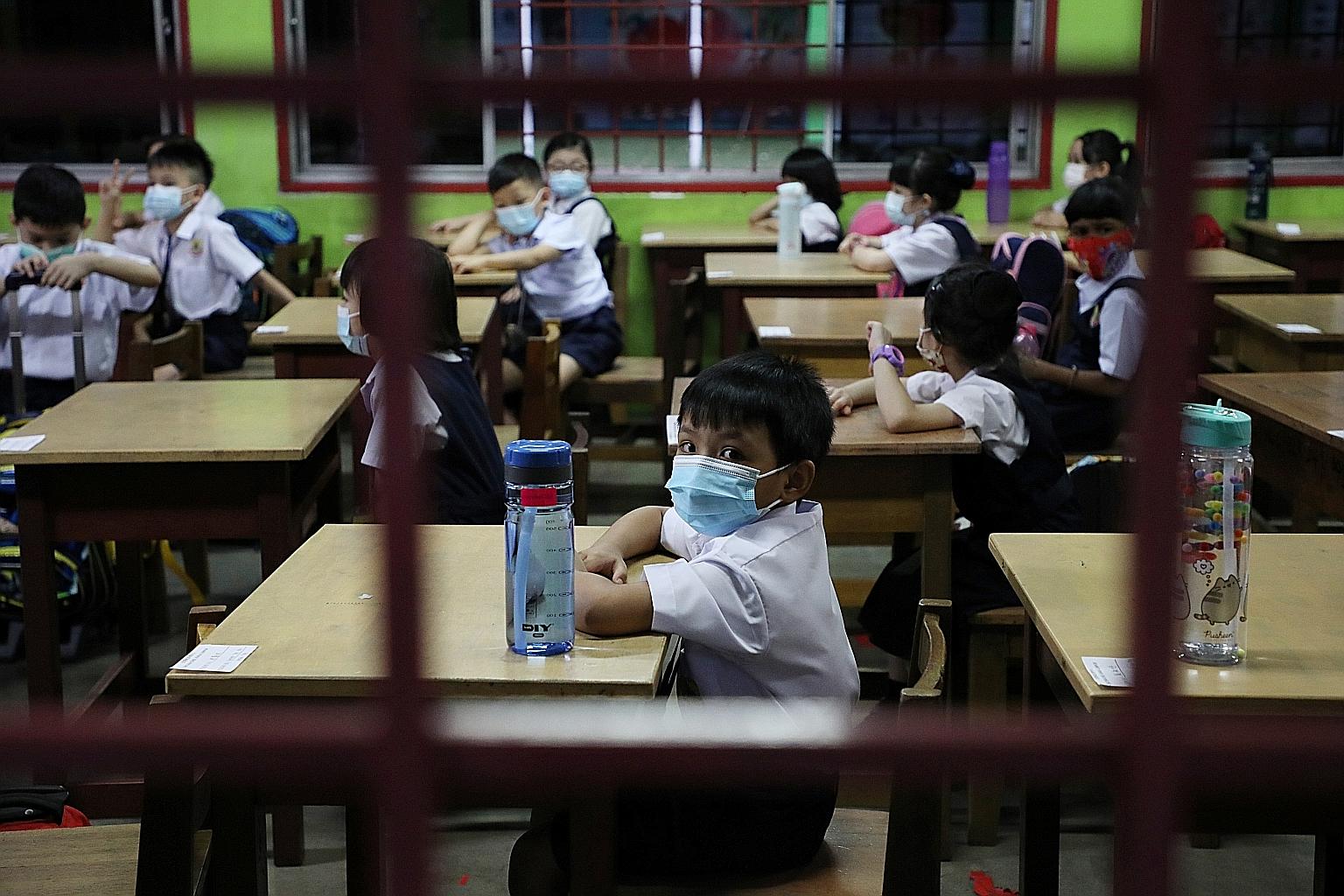Coronavirus: Global situation
Calls for return to e-learning as virus spreads in Malaysia schools Coronavirus
Sign up now: Get ST's newsletters delivered to your inbox

Pupils in a school in Kuala Lumpur. According to Health Minister Adham Baba, 83 Covid-19 clusters involving the education sector have been recorded this year, with 4,868 infections as at last Tuesday. PHOTO: REUTERS
Hazlin Hassan Malaysia Correspondent In Kuala Lumpur, Hazlin Hassan
Follow topic:
Nearly 5,000 Covid-19 infections in schools across Malaysia have been logged this year, fuelling calls for a return to virtual classes and for Education Minister Radzi Jidin and his two deputy ministers to step down.
Opposition MPs from seven political parties slammed the Education Ministry over the lack of clear directives to schools on what to do in the event of infections.
"What is happening now is that many of those managing the schools are lost when cases rise in schools," they said in a joint statement yesterday.
National Parent-Teacher Association president Associate Professor Mohd Ali Hassan said the situation was worrying.
"The Education Ministry and Health Ministry should take immediate action by closing down schools for the time being until the situation is stable," he told The Sunday Times.
The delay in vaccinating teachers also meant they are susceptible to contracting the virus, he added.
According to Health Minister Adham Baba, 83 Covid-19 clusters involving the education sector have been recorded this year, with 4,868 infections as at last Tuesday.
"From these 83 clusters, 49 clusters involving 2,617 cases are still active, while 34 with 2,251 cases have ended," Datuk Seri Dr Adham said in a statement last Wednesday. Four new school clusters were recorded as at last Friday.
Parents have also expressed worry over a lack of transparency, with news of Covid-19 infection spread by word of mouth instead of from official announcements by schools or the authorities.
Along with the dearth of transparency, an apparent lack of clarity on procedures is also creating frustration among parents, with schools allowed to remain open even after cases are detected.
Following public disquiet over the matter, Deputy Education Minister Mah Hang Soon declared last Wednesday that any school with even one confirmed Covid-19 case will be closed for two days.
"Schools with positive cases will be closed for two days. The school can be disinfected completely, and the teachers, students, and parents will have an emotional buffer space, which will prevent unnecessary panic and misunderstanding," Datuk Mah told the Chinese-language Sin Chew Daily newspaper last Wednesday.
In Sabah, one religious school in Kota Kinabalu has recorded 72 infections. In Johor, at least 27 schools were closed last week following infections among staff and students, while 19 schools in Selangor were also closed after cases were detected.
But opposition MP and former deputy education minister Teo Nie Ching said that she had received at least five complaints last Wednesday where schools were confirmed to have cases but were not shuttered. "Parents still have to send their children to school. When asked why the headmaster or the principal did not issue a notice to close the school, they said they have yet to receive any official letter authorising them to close the school," Ms Teo said in a statement last Thursday.
While home-schooling may not be ideal for all students, some parents feel it is better than exposing their children to the virus.
"If my child doesn't go to school, she will lose out because her school does not do remote learning. But at the same time, I am worried about the virus. I have been feeling sick thinking about this, waiting for the government to close physical schools," legal officer Noor Aida, 42, told The Sunday Times.
Others are worried about non-compliance to safety protocols, called standard operating procedures (SOP) in Malaysia, on the part of other students and their family members.
"I have faith in my children's school SOP. What I don't have faith in is how parents conduct themselves outside, whether at work or when shopping for basic necessities. And the worst of it is that schools are the ones suffering the brunt of these poor decisions," said housewife Mary Gan, 41.

